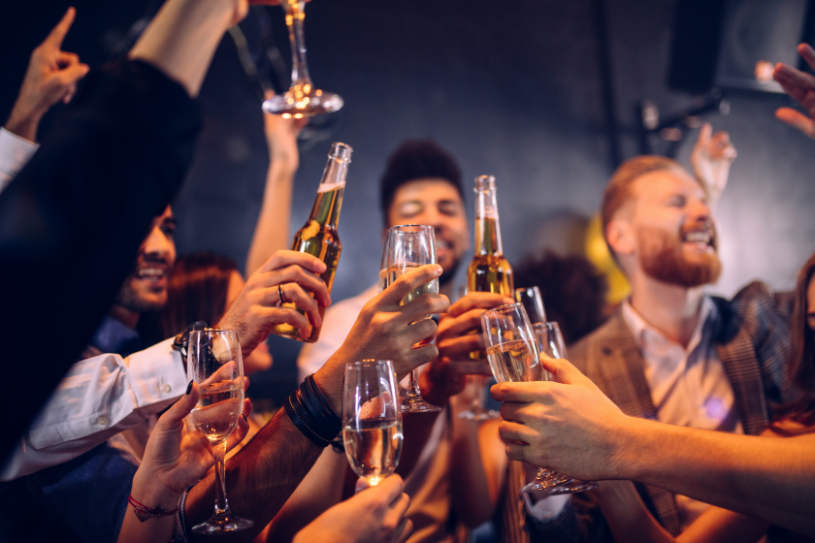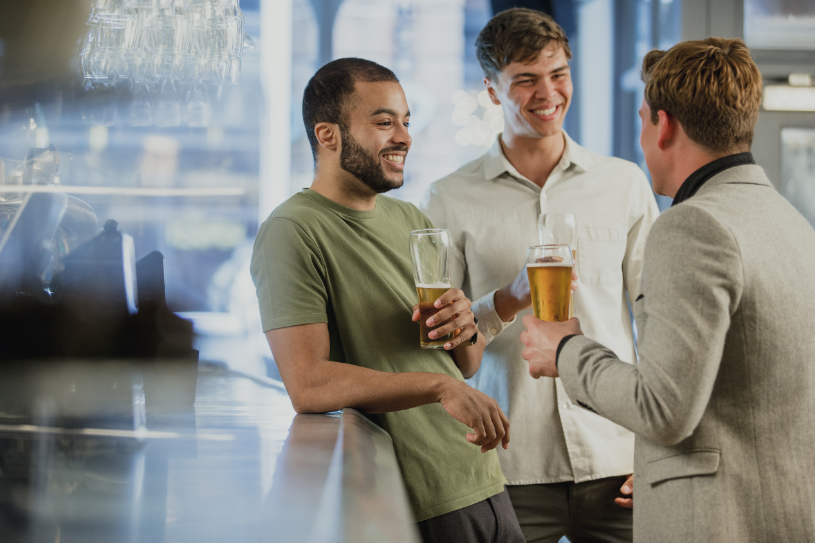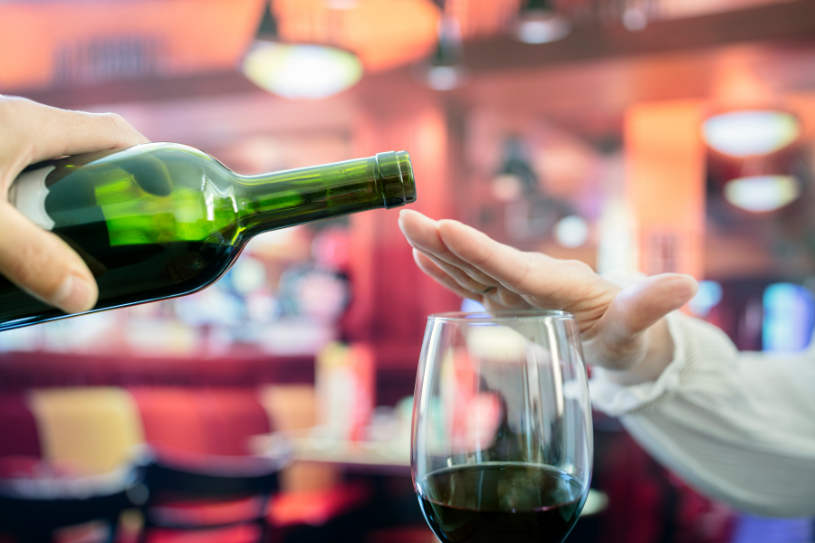The definition of a social drinker is one who regularly drinks alcohol in various social settings but does not allow the drinking to disrupt personal life or create mental, emotional, or physical problems. Basically, a social drinker is one who drinks without letting the habit degenerate into alcoholism.
Table Of Contents:
This article reviews the benefits, dangers, problems, and warning signs that one needs to watch out for to ensure that being a social drinker does not graduate into becoming a social alcoholic.
What is a Social Drinker?
While the provided definition is not an official one, there are some generally accepted guidelines for safe drinking limits that separate the act from alcoholism or binge drinking.
- Men aged 21-65 should have at most 14 drinks per week, with no more than four at any one sitting.
- Women and people over 65 should have at most 7 drinks per week, with no more than three at any one sitting.
While these guidelines may seem useful, in fact, they may have limited applicability. A true definition would have to factor in each person’s ability to handle alcohol (no two people are precisely alike here), and there is no universal standard that allows us to do so.
As it stands, the guidelines listed above might be considered unrealistic or overly restrictive in some cultures. They might make sense in a Mediterranean country like France, Italy, or Spain, where it is customary to drink a glass of wine with dinner. But rigid standards don’t necessarily dovetail with the need for people in other cultures to relax and celebrate by drinking. In the United States, for example, someone who drinks larger amounts on a semi-regular basis would likely still classify themselves as a social drinker.
To Identify Them, One or More of These Signs are Commonly Seen Among Them:
- Drink occasionally and only in certain social situations.
- Seldom if ever drink to the point of intoxication.
- Seldom if ever say or do anything they regret while intoxicated.
- Do not get in trouble with other people or with the law because of alcohol use.
- Do not spend more than they can afford on alcohol.
- Do not think about alcohol when they’re sober.
- Do not question their alcohol consumption.
- Do not face scrutiny or criticism from family or friends because of their drinking.

Expected Benefits of Social Drinking
Why do social drinkers consume alcohol at all? These are some of the reasons:
- To relax. Many people who live stressful lifestyles (which is just about everyone these days) come to rely on a drink or two, alone or with loved ones, to help them relax after work.
- To fit in. At parties and other gatherings, people may use alcohol as a way to reduce their social anxiety and feelings of self-consciousness or simply because others are doing it.
- To celebrate. Weddings, birthdays, milestones, job promotions, the Super Bowl: if it’s a happy, exciting, or meaningful event, it’s likely the alcohol will be flowing.
- For better heart health. Some studies suggest that small daily doses of alcohol (like good quality red wine) can be beneficial for health and specifically for the heart.
There are other ways to relax, fit in, celebrate or promote better heart health. But in American culture, many people start drinking without giving it a second thought.
Dangers of Social Drinking
Alcohol is a toxin, and it has damaging effects on the body when consumed to excess. Regular drinking of more than a glass or two per day can lead to increased risk for:
- High blood pressure
- Cardiovascular events
- Some forms of cancer
- Liver problems
Even when alcohol consumption isn’t frequent enough to cause physical damage, there are still potential hazards:
- Every drunk driver is prone to accidents, which can be fatal to themselves or the innocent.
- Pregnant and breastfeeding women can endanger their babies if they drink.
- People may take particular types of medications that don’t mix well with alcohol.
- Individuals who are vulnerable to alcohol—for example, those who have alcoholics in their family—may see their “social drinking” spiral out of control in as little as a few weeks.
One thing that has changed in recent times is the freedom that people have to go to bars and other public spaces to drink, considering the situation of the covid-19 pandemic and the strict rules given about social distancing. It has severely impacted the pattern of drinking of a lot of social drinkers – especially the younger ones that almost always drink in groups.
Studies have taken a closer look at the possible reasons behind this behavior among young adults. It is almost as though the act of drinking alcohol together is done with some ingratiation motives that influence how young adults are viewed socially among their peers.
However, they seem to have found a way out. A way to enjoy drinks with friends and loved ones while staying within the limits enforced by social distancing. One of those ways is the introduction of virtual bars and happy hours.
The covid-19 pandemic and the strict rules given about social distancing have impacted the paterns of drinking.
These two concepts are not exactly brand new. In fact, the relationship between alcohol and social media and networking sites has been established by a study carried out in 2018. Occasional drinkers – again, especially the younger ones, are generally more likely to put up alcohol-related posts on their social media.
The concept has only become more expanded and popular with the restriction on movement. Beer brands have recognized the preference that consumers have for sharing drinks with people in a social context compared to drinking alone and have been heavily promoting the idea of virtual happy hours through video conferencing platforms such as Zoom, Hangouts, Houseparty, etc. to encourage the habit.

Social Drinker or Problem Drinker?
There are non-drinkers, occasional drinkers, social drinkers, and alcoholics. But what about social alcoholics that pass out from drinking every other weekend? They don’t feel the urge to drink during the week and lead an otherwise functional life but may spend Friday night through Sunday in an alcoholic stupor.
That form of alcohol use is classified as problem drinking. It typically occurs in the period between the late teenage years and early twenties, among those who are in high school or college and heavily influenced by peers.
Young problem drinkers start out seeking to forge close social bonds. Oftentimes, these people can reduce their drinking later on, after they mature and begin to take on more life responsibilities, such as beginning a career, starting a family, surviving an adverse drinking experience, and so on.
So a strong incentive is enough to make a problem drinker stop. And because they can do so suddenly and without withdrawal symptoms, they could not be classified as addicted.
Social Drinker or Alcoholic?
Social drinkers do not necessarily descend into alcoholism. That is a long process involving many factors.
They have fundamentally different motivations when drinking than alcoholics. They can stop anytime if they have a good enough reason to quit. Alcoholics, on the other hand, can have the best incentives and good intentions, but they are unable to cut back on their drinking without help from treatment professionals.
Developing social alcoholics are often in denial about their relationship with alcohol. They need to rationalize their behavior, which becomes increasingly dangerous and embarrassing. They usually recognize and acknowledge their problem only after an accident or a meaningful, negative alcohol-related event—or after they hit absolute rock bottom.
Assuming an individual not an alcoholic, drinking responsibly means drinking with full conscious awareness of what one is doing and why they’re doing it.
Warning Signs of Problem Drinking
When drinking is driven by compulsion or need rather than choice, it is time to take a close, honest look at the behavior. One may be in danger of slipping into addiction if it hasn’t happened already.
The Telltale Warning Signs of problem Drinking Include:
- Not realizing when it’s time to stop
- Not being able to stop, even if when they do know it’s time
- Multiple episodes of binge drinking. Studies have shown how this may affect the system.
- Getting drunk before arriving at gatherings
- Keeping frequent company with other heavy drinkers
- Drunk-driving or other risky behaviors under the influence
- Suffering from regular blackouts
- Friends and family members have begun to avoid a person when this person is drinking
- Engaging in random or risky sexual activities while drunk
- Feeling shame and guilt about drunken behavior
- Having friends or family express concern about one’s drinking
- Using alcohol as a reward
- Using alcohol to escape from stress and negative emotions
- Finishing other people’s alcoholic drinks
- Not being able to imagine one’s life without alcohol
- Denial and defensiveness in response to others questioning a person about their drinking
- Daily drinking outside of meals
If just a few of these signs are present, a person should quit drinking immediately and seek the counsel of an addiction treatment specialist.

Not Sure About Drinking Habits?
If someone wondered if their drinking habits qualify them as social drinkers, problem drinkers, or alcoholics? Here are some questions to ask that can help one make the determination:
- Does this person drink every day?
- Does this person miss alcohol if they have to go without it for too long?
- Does this person drink when they’re happy and when they’re sad?
- Does this person feel guilty about their drinking?
- Does this person make an effort to hide their drinking, or does this person lie about it?
- Does this person’s friends or family criticize their drinking?
- Has this person ever felt like they wanted to cut down on alcohol consumption?
- Does this person regret spending too much money on alcohol?
- Have their hangovers caused them to miss important events or damaged cherished relationships?
If someone answered yes to any or all of these questions, it likely indicates that they’re more than just a social drinker.
Here’s an experiment a drinking individual should try:
If they party every week, stop drinking for, say, a month. Still attend the parties but stay sober and observe how they feel.
- Is it difficult to interact without alcohol?
- Does this person feel stressed or uncomfortable with themselves?
- Were the interactions with people satisfying?
- Was it more than a little difficult to resist the temptation to drink?
An experiment like this is a good way to gain insight into the drinking habits because it allows evaluating how much a person depends on alcohol while interacting with other people. If their dependence is strong, the drinking may be something more than social—or at least heading that way, if the individual doesn’t take steps to reverse the trend.
How To Drink Responsibly?
Assuming an individual not an alcoholic, drinking responsibly means drinking with full conscious awareness of what one is doing and why they’re doing it.
If an Individual Chooses to Continue Drinking, Here’s How to Stay Safe:
- Educate themselves about alcoholism.
- Never mix alcohol with medications or other substances.
- Always eat something before drinking alcohol.
- Be sure to drink water before drinking alcohol.
- Don’t drink when in a bad mood, stressed, tired, or sad.
- Learn to recognize when to stop – and do it.
It is one thing to call oneself a social drinker, but it is another to completely understand the levels of control needed to be one. While there may be a few benefits to drinking socially, there are dangers to be considered too, as discussed in the article.
These dangers are accompanied by problems that may also be associated with alcoholism, so one needs to be aware and wary of them. If you or a loved one suspect that a habit of drinking socially is escalating into something more serious, seek professional help immediately.
Hope Without Commitment
Find the best treatment options. Call our free and confidential helpline
Most private insurances accepted
Page Sources
- Giancarlo Colombo, Paola Maccioni, Carla Acciaro, Carla Lobina, Barbara Loi, Alessandro Zaru, Mauro A.M. Carai,Gian Luigi Gessa, Binge drinking in alcohol-preferring sP rats at the end of the nocturnal period, https://www.ncbi.nlm.nih.gov/pmc/articles/PMC4047429/
- Fact Sheets - Binge Drinking, https://www.cdc.gov/alcohol/fact-sheets/binge-drinking.htm
- Current and Binge Drinking Among High School Students — United States, 1991–2015, https://www.cdc.gov/mmwr/volumes/66/wr/mm6618a4.htm?s_cid=mm6618a4_w
- Hanneke Hendriks, Bas Van den Putte, Winifred A Gebhardt, Megan A Moreno, Social Drinking on Social Media: Content Analysis of the Social Aspects of Alcohol-Related Posts on Facebook and Instagram. 2018. https://www.ncbi.nlm.nih.gov/pmc/articles/PMC6035352/
- Dolores Pushkar. Social drinking and cognitive functioning revisited: The role of intellectual endowment and psychological distress. 1994.https://www.researchgate.net/publication/15177430_Social_drinking_and_cognitive_functioning_revisited_The_role_of_intellectual_endowment_and_psychological_distress
- Eric Robinson,corresponding author, Melissa Oldham, Maxine Sharps, Alexandra Cunliffe, Jade Scott, Emma Clark, Katie Piercy, and Matt Field. Social Imitation of Alcohol Consumption and Ingratiation Motives in Young Adults. 2016. https://europepmc.org/articles/pmc4913807/bin/ze6002162984s1.doc
- J. M. Townshend, T. Duka. PATTERNS OF ALCOHOL DRINKING IN A POPULATION OF YOUNG SOCIAL DRINKERS: A COMPARISON OF QUESTIONNAIRE AND DIARY MEASURES. 2002. https://academic.oup.com/alcalc/article/37/2/187/101055
- Harvard School of Public Health. Alcohol: Balancing Risks and Benefits. https://www.hsph.harvard.edu/nutritionsource/healthy-drinks/drinks-to-consume-in-moderation/alcohol-full-story/
- D. J. Jones‐Saumty, A. R. Zeiner, Psychological Correlates of Drinking Behavior in Social Drinker College Students. 1985. https://onlinelibrary.wiley.com/doi/abs/10.1111/j.1530-0277.1985.tb05542.x
- May Sudhinaraset, Christina Wigglesworth, David T. Takeuchi, Social and Cultural Contexts of Alcohol Use. 2016. https://www.ncbi.nlm.nih.gov/pmc/articles/PMC4872611/




